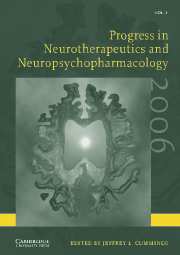
- Publisher:
- Cambridge University Press
- Online publication date:
- March 2010
- Print publication year:
- 2006
- Online ISBN:
- 9780511663529
- Subjects:
- Neuropsychology, Medicine

Published annually, volumes in this series provide readers with updates of clinical trial results, impacts of trials on guidelines and evidence-based practice, advances in trial methodologies, and the evolution of biomarkers in trials. The series focuses on trials in neurotherapeutics, including disease-modifying and symptomatic agents for neurological diseases, psychopharmacological management of neurologic and psychiatric illnesses, and non-drug treatments. Each paper is authored by a leader in the area of neurotherapeutics and clinical trials, and the series is guided by an editor-in-chief and editorial board with broad experience in drug development and neuropsychopharmacology. Progress in Neurotherapeutics and Neuropsychopharmacology is an essential update of trials in all aspects of the management of neurologic and neuropsychiatric disorders, and will be an invaluable resource for practising neurologists as well as clinical and translational neuroscientists.
"Insights provided in this text concerning clinical trials will allow prescribers to feel more confident regarding the medications they prescribe and the quality research on which clinical efficacy has been established. The research is presented in a detailed yet concise and very readable format. The text provides valuable information regarding neuropsychopharmacology research and treatment. It is a well-written and concise read for scientist-practicioners who want an understanding of the clinical trials that support multiple uses of many commonly prescribed agents. It is a must-read for neurologists, psychiatrists, prescribing psychologists, nurse practicioners, and neuroscientists, particularly those interested in clinical issues. Readers who have an interest in the neurobiology of psychiatric issues may be especially interested in this text. This text would be an excellent complement to pharmacology courses because it provides valuable information concerning the drug development process. In addition, this collection of works may facilitate flexible and creative prescribing practices by evaluating agents in populations and for symptoms other than those for which they were initially developed."
 Loading metrics...
Loading metrics...
* Views captured on Cambridge Core between #date#. This data will be updated every 24 hours.
Usage data cannot currently be displayed.